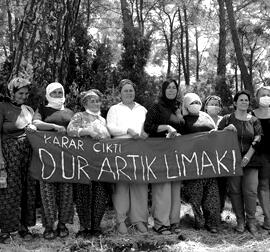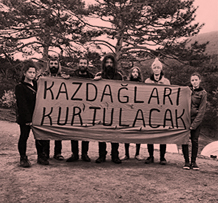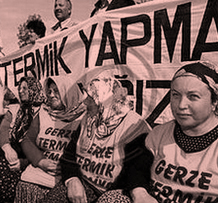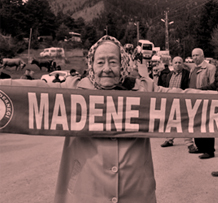Since October 2019, the residents of Mugla Ikizkoy have been protecting the Akbelen Forest, which is at risk of getting destroyed to expand the lignite mining site that fuels the Yenikoy-Kemerkoy thermal power stations. During this time, the residents’ water was cut off by the company, the villagers working at the mine were threatened to be fired, and the gendarmerie forces intervened at the watch posts.
Located on Milas-Oren highway, İkizköy consists of the following regions: Işıkdere, Karadam, Ova and Akbelen. The residents working in agriculture and stock raising are middle aged and older. The younger population migrated to cities for job opportunities or they are students at universities. Majority of the men work at the mines outside the village and at the archeological site in Ikizdere. It is the women who protect the village and lead the Akbelen resistance.
Ikizkoy’s Akbelen Forest resistance began in October 2019. The company operating the mine and the thermal power stations where the mine supplies the lignite, sent a notice to the villagers to sell their land to the company. The Akbelen Watch began and the Ikizkoy Environment Committee was established at the same time. The Ikizkoy Environment Committee consists of volunteer advocates and villagers. Their door is open to anyone who wants to support their cause. The core group is around 15 people. It’s a mechanism that facilitates the decision making process. The committee is a member of the Mugla Environment Platform Milas Council.
Isikdere, the neighbouring region, was expropriated by the same mining company in 2017-2018. Approximately 40-50 households were displaced. Majority of them left their land and fields behind and moved to Milas downtown. Some moved to the nearby Ova region.
Seeing the loss and dispossession taking place in Isikdere, Karadam residents decided to put a stop to it when the security of their land was also threatened. They were not going to leave their fertile soil behind. Isikdere, once green with olive trees, had turned into a dark mining site. The mining in this area led to the death of trees and animals and a decrease in the olive yield in the neighboring regions.
The villagers decided to put up a fight to protect nature, olive groves and the forest but they didn’t know where to start and who to consult. They were inexperienced. Retired from the Directorate of National Education, Mehmet Ogulturk, an intellectual among the villagers, told them that they have a right to object. The public information session requested by the company turned into a meeting in which the villagers decided to hold on to their land and refuse selling to the company, under the leadership of Ogulturk. He introduced them to the Mugla Environment Platform.
Administrative applications were made in 2019 and 2020. They became acquainted with lawyers, went to the Mugla Metropolitan Municipality and the Grand National Assembly of Turkey. They wrote petitions to all relevant ministries stating that they don’t want the expropriation. They couldn’t get a hold of any AKP members in the assembly, including Mugla deputies. Their contact was limited to representatives of opposition parties.
After they came back from Ankara, the mining company cut the water of the village for 10 days to punish the villagers. The walls of their houses got cracked due to dynamite explosions.
The resistance led to a pressure on the men working in the mines. The workers were threatened to get fired if they and/or their family members went to the watch post.
During the lockdown that started on April 23, 2021, workers went to Akbelen Forest to cut down the trees just like in Ikizdere district of Rize. Realising what was going on, Ikizkoy villagers prevented the destruction.
With Karadam Karacahisar Neighbourhoods Nature Conservation and Solidarity Association’s (KARDOK) application to get information, it was learned that permission to open a lignite mine in the 740 decare Akbelen Forest was granted with the approval of the Ministry of Agriculture and Forestry. The residents of the region thereupon filed a lawsuit for a stay of execution through KARDOK against the General Directorate of Forestry at Mugla 1st Administrative Court on May 4, 2021.
The short video of Nejla Isik, a villager and one of the leaders of the resistance, where she cries for help in tears, spread across social media and put the Akbelen Resistance on the map. The villagers of İkizköy filed a criminal complaint after the Milas General Directorate of Forestry claimed that the trees in the Akbelen Forest would be cut down on July 15. They began cutting the trees on the morning of July 17. Environmental organisations and individuals who had seen Isik’s video stood by the villagers. The watch that started in the tents set up that day still continues 24/7. They take turns to keep guard in pairs. In the evenings everyone goes to the watch post after they finish their work.
Wildfires started in Ege and Akdeniz regions on the last days of July 2021. On August 8, 2021,
Milas Operations Directorate of Forestry wanted the trees to be cut down by the workers they assigned and the volunteers coming from Denizli to put out the wildfires. The wildfires were used as an excuse to cut down 105 trees. The people cutting down the trees were using chainsaws with the logo of the company. The villagers succeeded at stopping the trees from getting cut down.
Two days later, on August 10, 2021, approximately 250 gendarmerie officers went to the watch post and asked the crowd to vacate the area. But the area they occupied was private property and they had permission to be there. When the villagers didn’t leave, the gendarmerie forces dragged them out of the area by force. The lawyers who were there to support the villagers were also battered.
Regarding the annulment of the Integrated Facility Environmental Impact Assessment exemption case filed in Mugla 3rd Administrative Court and the annulment of cutting down of the forest case filed in Mugla 1st Administrative Court in August 12,2021, both courts ruled in a stay of execution. In accordance with the decision, an expert exploration and examination was carried out on September 7, 2021.
The examination of the expert panel started tensely, as the judge did not want to take anyone on the expedition except the plaintiff lawyers. During the discovery, Judge Murat Yüksel called the lawyers of the case Arif Ali Cangı and İsmail Hakkı Atal ‘mentally ill’ and environmental volunteer Environmental Engineer Deniz Gümüşel as ‘retarded’. Upon the incident, the plaintiff İkizköy lawyers Arif Ali Cangı and İsmail Hakkı Atal and Şiar Rişvanoğlu from the Adana Bar Association filed a judge application for rejection.
In addition, lawyer Atal filed a complaint to the Board of Judges and Prosecutors for Judge Yüksel to be dismissed from the profession of judge due to his biased attitude.
With a new regulation published in the Official Gazette on March 1, 2022, it became possible to open olive groves to mining projects in Turkey. On the morning of March 31, 2022, construction machinery belonging to Limak and İçtaş started to remove olive trees in İkizköy. While the villagers rushed to the scene to stop the activity, İkizköy Environmental Committee called for support for the protection of the olive groves. Private security guards of the company battered the people of İkizköy who wanted to stop the dismantling. On April 21, 2022, the Ikizköy Environment Committee and the villagers were summoned to testify on the charge of “beating private security and preventing freedom of work”.
At midnight connecting August 10, 2022 to August 11, 2022, the gendarmerie raided the area where activists keep vigil. 11 people were beaten by a 250-person gendarmerie team and were forcibly removed from the private area. A lawsuit was filed against the battered villagers on the charge of "resisting the gendarmerie". Despite their presence at the second hearing of the case, the witnesses of the defendants were not heard. All requests of the defense lawyers, including the investigation of who ordered the midnight raid on the gendarmerie, and the filing of the Forensic Medicine reports that determined the injuries of the defendants as a result of the disproportionate use of force by the gendarmerie, were denied. The lawyers, who did not accept the prosecutor's opinion demanding punishment, requested time to present their defense on the merits in writing, and also requested that a suitable hearing environment be provided for a fair trial for the next hearing.
The third hearing of the case was on September 27, 2022 but postponed to November 21, 2022, since the request of the defense for dismissal of the judge sent to the Bodrum High Criminal Court for evaluation was not evaluated.
The fourth hearing of the lawsuit filed against two women who resisted mining activities in Akbelen Forest on the grounds of resisting the gendarmerie was held at the Milas 3rd Criminal Court of First Instance. While the Bodrum High Criminal Court decided to reject the judge's request, the lawyers objected to the decision. After the appeal was evaluated, the file was sent again and the next hearing was postponed to February 2, 2023.
In the fifth hearing on February 2, the hearing was postponed to March 27, 2023, without the defendants making a defense, on the grounds that a judge's request was made for refusal and the file had not yet reached the prosecutor's office.
At the sixth hearing on 27 March 2023, UN Special Rapporteur on Human Rights Defenders Mary Lawlor's statement on the subject was submitted to the case file. In the hearing, which human rights organizations watched as observers, the court adjourned the case to 26 June 2023.
On March 31, 2022, the villagers who opposed the cutting of the Akbelen Forest and olive groves in the region by the YK Energy company were battered by the company's private security, while those who reacted to this were detained and an investigation was launched against them. Examining the initiation of an investigation against five people for the crime of "resistance to the officer in charge", the prosecution decided on 7 June 2023 that there was no room for prosecution.
The seventh hearing of the lawsuit filed on the grounds that the people of İkizköy Gülören Demir and Füsun Ergün, who resisted the felling of trees by YK Enerji, was held on 26 June 2023. The court sentenced the life defenders to 6 months and 20 days in prison. The sentences were commuted to a judicial fine of 200 days. In addition, Demir was given a judicial fine of 551 days for insulting the gendarmerie. Citizens, on the other hand, announced that they would appeal the decision by appealing.
Just a few days after the İkizköy Akbelen Resistance celebrated its second year, company teams and gendarmerie came to the region in the early morning hours of July 24, 2023, accompanied by TOMAs. While the trees were cut, the insurgents were prevented from entering the forest.
Ikizköy residents of all ages and ecology advocates from many parts of Turkey started civil disobedience and hugged trees. The activists were removed from the area after a while by the gendarmerie forces. Some activists were detained.
One of those detained was Deniz Gümüşel from the İkizköy Environment Committee. Gümüşel, whose statement was taken at the Milas Gendarmerie Station, was then transferred to the Milas Courthouse. Gümüşel, who was charged with "resistance to a public official" in his statement to the prosecutor's office, was referred to the court for a ban on leaving the country and for judicial control. Milas Criminal Judgeship of Peace issued a ban on leaving the country for Gümüşel and a ban on entry to Milas district borders.
On 8 August 2023, the Turkish Grand National Assembly convened extraordinarily with the agenda of “Akbelen”. The people of İkizköy, people of Karacahisar, people of Çamköy set off from Akbelen to Ankara, towards the Parliament one day before. Life defenders were stopped many times on the way to Parliament. Despite all the obstacles, they managed to reach the Assembly with olives, pine honey and walnuts. However, the motion to hold a general meeting for Akbelen Forests, which was put to the vote, and the general meeting were rejected by AKP and MHP votes.
Again in August 2023, it was revealed that many citizens who went to the resistance area in Akbelen to support and parked their vehicles on the side of the road because the gendarmerie did not show a parking lot, were given traffic fines. Activists objected to the fines.
In the early morning hours of September 12, 2023, the gendarmerie began to evacuate the tented watch area. They set up a barricade at the entrance of the forest and surrounded the area. While no one from outside was allowed to enter the area, the communication rights of people in the village were usurped with signal jamming devices. Ahmet Tatar, an activist from the Bursa Water Collective at the vigil, was detained. Nejla Işık, Aytaç Yakar and Güler Döşeme, residents of İkizköy, were blocked by law enforcement officers when they tried to enter the guard area by overcoming the barricade.
On January 25, 2024, Nejla Işık, İkizköy Environmental Committee Spokesperson Hasan Yorulmaz and 10 villagers were called to testify to the gendarmerie. Many people who protested against the cutting of trees and kept watch were fined for 'entering the forest without permission', 'hanging posters' and 'setting up tents'. Villagers Ali Güler, Ahmet Atar, Nejla Işık, Zülfikar Yakar and Haydar Demir were fined 40 thousand 189 TL each, Eyüp Çukur was fined 1,300 TL for setting up a tent in the guard area, and Esra Işık was fined 1,200 TL for entering the forest without permission. was cut off.
On January 26, 2024, the Social Democracy Foundation (SODEV) presented the "Human Rights, Democracy, Peace and Solidarity Award" to the Akbelen resisters.
The Turkish Thoracic Society, presented the 2021 Environmental and Climate Issues Advocacy Award to the Ikizköy Environment Committee, which defended the Akbelen Forest against coal mines and the Validebağ Grove Volunteers.
Eight villages in Muğla have been destroyed so far due to coal mines and many villagers have been displaced. An area of approximately 55 thousand decares turned into a mining site, approximately 30 thousand decares of which was forest land. The remaining area was agricultural land and olive groves.





